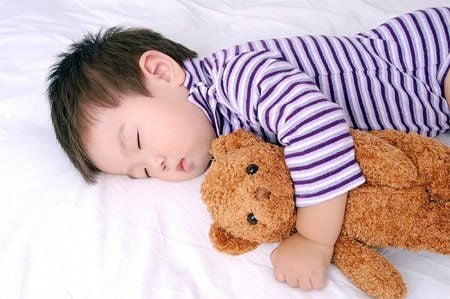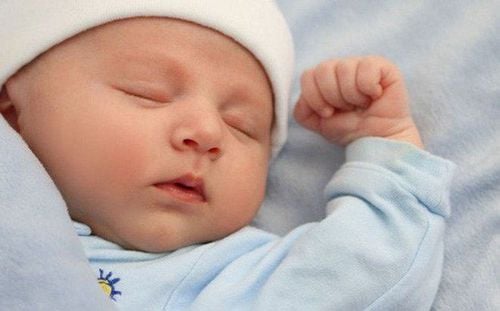Sleep plays a very important role in the physical and mental development of children. Letting children sleep alone is a way to improve sleep, thereby helping children develop most comprehensively.
1. Why should children sleep alone?
Letting children sleep alone brings many benefits to the health of children and parents and forms good habits for children. The benefits of letting children sleep alone include:
- Reducing the risk of death in infants: A study in the UK showed that more than half of sudden infant deaths were due to suffocation caused by the mother pressing on them.
- Children sleep easier: When sleeping with their parents, children may form some bad habits such as asking for food in the middle of the night, crying a lot and therefore, children have more difficulty falling asleep, and have difficulty falling back asleep if they wake up at night. Children who sleep with their parents are affected by their parents' arguments or their parents' habit of sleeping late will affect their children. If children sleep on their own, they will form good habits that help them lull themselves to sleep, sleep deeply and sleep on time, which will help them form a biological clock from an early age.
- Letting children sleep alone helps them increase their independence when they are young, they are more confident, and do not rely too much on their parents to sleep.
- Avoid negative impacts on children's psychology: If children sleep with their parents until they grow up, if they wake up while sleeping, they may encounter situations that are not good for their psychological development, such as parents having sex or parents arguing, or committing acts of domestic violence. These situations can happen and shock the child's psychology.
- Parents will have their private life, have space to express personal feelings, and maintain family happiness. In addition, parents will also have better sleep because they do not have to wake up every night to lull their children or meet their unnecessary needs.

2. When should children sleep alone?
Choosing the time for children to sleep alone also depends on each child, it can start early if the child cooperates. According to research, children should not be allowed to sleep alone too late after 3 years old because at this time children are already able to distinguish gender. In Vietnam, letting children sleep alone is still met with many objections, so in the Vietnamese environment, separating children to sleep alone can make children worried and scared, but parents should persuade and reassure their children so that they can sleep alone when they are 4-6 years old.
The earliest time for children to sleep alone can start when they are 4-6 weeks old, at this time parents can let their children sleep alone in a crib, but must ensure monitoring and control to ensure the child is as safe as possible.
3. How to train your child to sleep alone
When training your child to sleep alone, you can follow these steps to help your child gradually get used to sleeping away from his or her parents:
• Initial stage: First, you should start by letting your child sleep alone in a separate place, but close to where the parents sleep. Parents need to be right next to them to observe and pay attention to their child's safety. In addition, to avoid children being scared when they feel left alone, it will have a negative impact on them.
• Stage 2: When the child has gradually accepted having to sleep alone, the transition time to this stage is different for each child. Next, parents should put a curtain between the parents' and children's sleeping places.
• Stage 3: Encourage and persuade your child to sleep in a separate room.
In general, letting your child sleep alone does not need to be too quick, you should pay attention to your child's feelings. And especially, always remember to observe your child to create the safest environment possible.

4. Notes when letting children sleep alone
• Parents should create a space and items that are truly safe for children. When children sleep alone, they should use soft blankets to avoid suffocation while sleeping, and should put a cover around the bed for children to ensure safety, especially for children under 3 years old.
• Do not force children to sleep alone when you feel they are not really ready, often convince them about interesting things when sleeping alone so that they gradually feel more interested in sleeping alone.
• If children have to sleep alone when they are about to have a sibling, parents should tactfully share with their children. Do not let children feel abandoned because their parents have a baby, this causes deep psychological damage to children. This leads to children not liking the sibling, not wanting to be close to the sibling, and sometimes having violent behavior towards the baby.
In some cases, children should not be allowed to sleep alone:
• Children's health conditions are abnormal: Children are born with abnormal physical conditions, may have some dangerous diseases, and need comprehensive care from their parents.
• Children are not ready to sleep alone.
• Family conditions are not suitable for sleeping alone, such as not being able to create a comfortable and safe environment for children, so children should not sleep alone. Because above all, the safety and health of children are the most important.
Letting children sleep alone early brings many benefits, but children must always sleep under the control of their parents. Each child has a separate psychology and personality, so parents do not need to be too stressed, be patient in persuading children and not forcing them to do as their parents want.
Children from 6 months to 3 years old are susceptible to respiratory problems, skin diseases and gastrointestinal infections... parents need to pay special attention to caring for and providing adequate nutrition for children. If children are not provided with adequate and balanced nutrients, it will lead to diseases of excess or lack of nutrients, which negatively affect the comprehensive development of children in terms of physical, mental and motor skills. Parents should supplement their children with support products containing lysine, essential micronutrients and vitamins such as zinc, chromium, selenium, and B vitamins to fully meet the nutritional needs of children. At the same time, these essential vitamins also support digestion, enhance the ability to absorb nutrients, help improve anorexia, and help children eat well.
Parents can learn more:
Signs of zinc deficiency in children
Micronutrient deficiency and failure to gain weight in children
To arrange an appointment, please call HOTLINE or make your reservation directly HERE. You may also download the MyVinmec app to schedule appointments faster and manage your reservations more conveniently.














